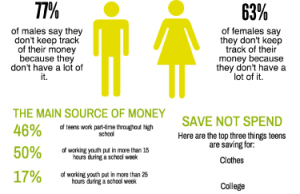Each student is required to take Personal Finance their junior or senior year in order to graduate from FHN. Throughout the semester, upperclassman are taught the concept of borrowing, the cost of credit and how to manage money.
“It’s the most important class to help you be successful in adult life,” Personal Finance teacher Mim Eaton said. “I was really grateful when it became a required class to graduate because I knew it would be helpful for students to learn how to work through tough financial situations.
Eaton has been through her own downfalls with money. She got her first credit card and her first apartment at the age of 18. After finishing her degree, she took out a loan for her first car. With these factors and a divorce included, this led to her filing for bankruptcy twice.
“Through it, I learned debt doesn’t bring hopelessness,” Eaton said. “If you want to increase your income and put yourself in a better place, you’ll take the steps to get there.”
One of the many things Eaton focuses on in her class is the aspect of having a credit card and the dangers that come with one, including interest rates and fraudulent charges. This is one of the main factors that leads to students getting into debt.
So many students don’t understand what their credit score is and how much that number can affect their life,” Eaton said. “Students need to track their credit and pay attention to their credit score. Credit doesn’t always have to be a scary thing.”
Eaton helps show how easy credit cards are to manage by teaching students the pros and cons of using one. She uses her personal experiences and knowledge to prepare students for their future.
“Her experiences helped me connect real life to what we were learning,” senior Emma Cleaveland said. “It made me think of her as someone who knows what they’re talking about and a good person to learn from.”
Eaton believes starting students out early on learning tips and background information about finance will only help them down the road.
“Money doesn’t buy your happiness,” Eaton said. “There’s always a way out of debt and always a way that things can get better. The sooner you start managing and budgeting, the better off you’ll be in the long run.”









